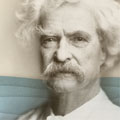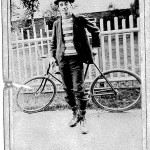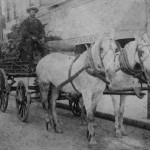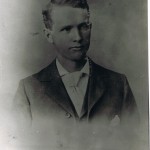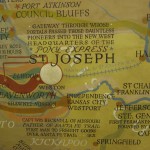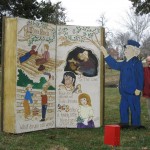We spend another day driving south, today through three Mississippi river towns famous in part for their connection to the life of Sam Clemens (Mark Twain) as a steamboat pilot—what he called “the only unfettered and entirely independent human being that lived on earth.”
I especially enjoy Greenville, not for its plantation-era Twain history but for a charmingly strange shrine made from a discarded school bus, cinderblocks, stray lumber and a country-store-turned-home, all painted pink, yellow, red, white and blue. The Rev. H. D. Dennis, a Baptist preacher who is closing in on 100, created this “House of Prayer for All People.” “Respect and love one another,” he says. “We’re all the same in God’s eyes.”
The aroma inside my head from the culinary carnival that awaits us in New Orleans focuses me on food. In Greenville, I walk through the kitchen (that’s the entrance) to eat a heaping portion of shrimp at dilapidated Doe’s Eat Place; in Vicksburg, at Rusty’s, seated under a 15-ft. photo mural of the city’s waterfront in 1910, I lunch on fried green tomatoes with hollandaise and crab sauce; in Natchez, I just buy a can of peanut brittle and lead-foot it in the direction of New Orleans’s beignets, Bananas Foster, and red beans and rice.
Trencherman Twain wrote of a $10, four-hour, French-restaurant luncheon—sheepshead fish, oysters, shrimp, game birds—that he had consumed in New Orleans with his riverboat pilot buddies. My dream is to dine on the same kind of fish, sheepshead, that he had eaten in New Orleans more than 150 years ago. So I head for Antoine’s, a French Quarter institution operated by the fifth generation of the family that opened the restaurant in 1841.
But the woman behind the reservation desk makes clear that I’m not going to be served such trash fish at Antoine’s. Fortunately, Michael Kavanaugh, manager of the Hermes Bar at Antoine’s, overhears the conversation. A Twain enthusiast, he points in the direction of the nearby Hermann-Grima House, an 1831 mansion where classes in 19th-century cooking are offered in the courtyard.
He sends us off with a paraphrase of a Twain quote about the local Mississippi River’s muddy, mulatto complexion: “If you will let your glass stand half an hour, you can separate the land from the water as easy as Genesis; and then you will find them both good: the one good to eat, the other good to drink.”
We find the Hermann-Grima House closed for the weekend. Luck intervenes. A woman, who later identifies herself as Dr. Arwen Podesta, a psychiatrist on the Tulane University faculty, stops in front of the house and whips out her cellphone. Suddenly, like magic, another woman appears from behind the Hermann-Grima courtyard door. She is the woman of my foodie dreams, Elizabeth Pearce, whose business card reads “Culinary Historian, Consultant & Guide.”
We strike a deal. The three of us—Twain trippers Alyssa, Dan and Loren—will play attentive listeners during a two-hour photo shoot designed to promote Pearce’s Cocktail Walking Tour in the French Quarter. In return, she will buy the food—and help us cook—a Twain fish feast the way it was prepared in his era. But where, Pearce asks, are the fish recipes I want her to use?
I recall Andrew Beahrs’ book, Twain’s Feast: Searching for America’s Lost Foods in the Footsteps of Samuel Clemens. It includes a chapter on the preparation of his favorite New Orleans fish. I scour Kitchen Witch and other French Quarter bookshops. No success. Joe Clark, a 40-year librarian behind the information desk at the city’s main library, says none of the city’s libraries has a copy.
Clark and I spend 20 minutes trying to find Beahrs’ New Orleans chapter online. A library customer interrupts our search to tell Clark the library’s first-floor men’s urinal is overflowing. Clark insists that my PP syndrome will lead to success. He is not talking about urine but his slogan: Persistence pays. Sure enough, I find a copy of Beahrs’ book at the Southern Food and Beverage Museum gift shop.
Pearce says it will take us two hours to prepare and cook two Twain fish dishes over an oak fire. It takes us closer to three hours. Observing the speed at which I’m peeling and pulling the heads off of the fresh shrimp Pearce helps and tells me to leave the shrimp deveining to her.
The sheepsheads of Twain’s day are unavailable and not especially coveted. Only 20 percent of the bony sheepshead is usable meat. So Pearce has bought a drum, a kind of fish that we saw being caught the previous day in Bayou Bienvenue.
For the baked drum fish, Pearce adapts a recipe for sheepshead from The Picayune’s Creole Cook Book that requires one large onion, thyme, cracker crumbs, a half bottle of white wine, flour, butter, six fresh tomatoes, a mound of mushrooms, two dozen Lake Shrimp and salt and pepper.
But my favorite is the boiled drum, also from a The Picayune’s Creole Cook Book recipe for sheepshead. I suspect the secret is in the quart of cream, the yolks of four eggs and butter, a mixture that would make even a rubber tire edible.
While we cook, eat, wash dishes and say farewells, Pearce answers our endless questions, despite her sore throat. She grew up in nearby Covington, attended Louisiana State University and has always lived in the New Orleans area, except for going to university in Italy and teaching English in Spain. She has no favorite comfort-food dish that she cooks at home: “I clean out the refrigerator a lot.”
But she has a favorite place, New Orleans, especially at Mardi Gras: “Mardi Gras is my high holy day. I can’t stand Christmas.” For Pearce, Carnival is about the costuming and the hospitality,as well as the fact that there’s not obligation to buy gifts. She doesn’t see New Orleans as a den of booze, beads and bordellos, but as a city of art and food and drink and music and, yes, the kind of fun that exists everywhere but is usually hidden. “Life,” she says, “is about pleasure, not anger.” She describes another favorite time in New Orleans, the Sunday of Labor Day weekend, when the Black Men of Labor, who promote traditional New Orleans jazz, and participants in “Southern Decadence,” the gay Mardi Gras, both parade. The different parades intersect, and thousands of different people mingle. “We’re all here and everybody is having a good time,” Pearce says. “There is a tolerance. You can’t be a total bigot.”
Loren Ghiglione




